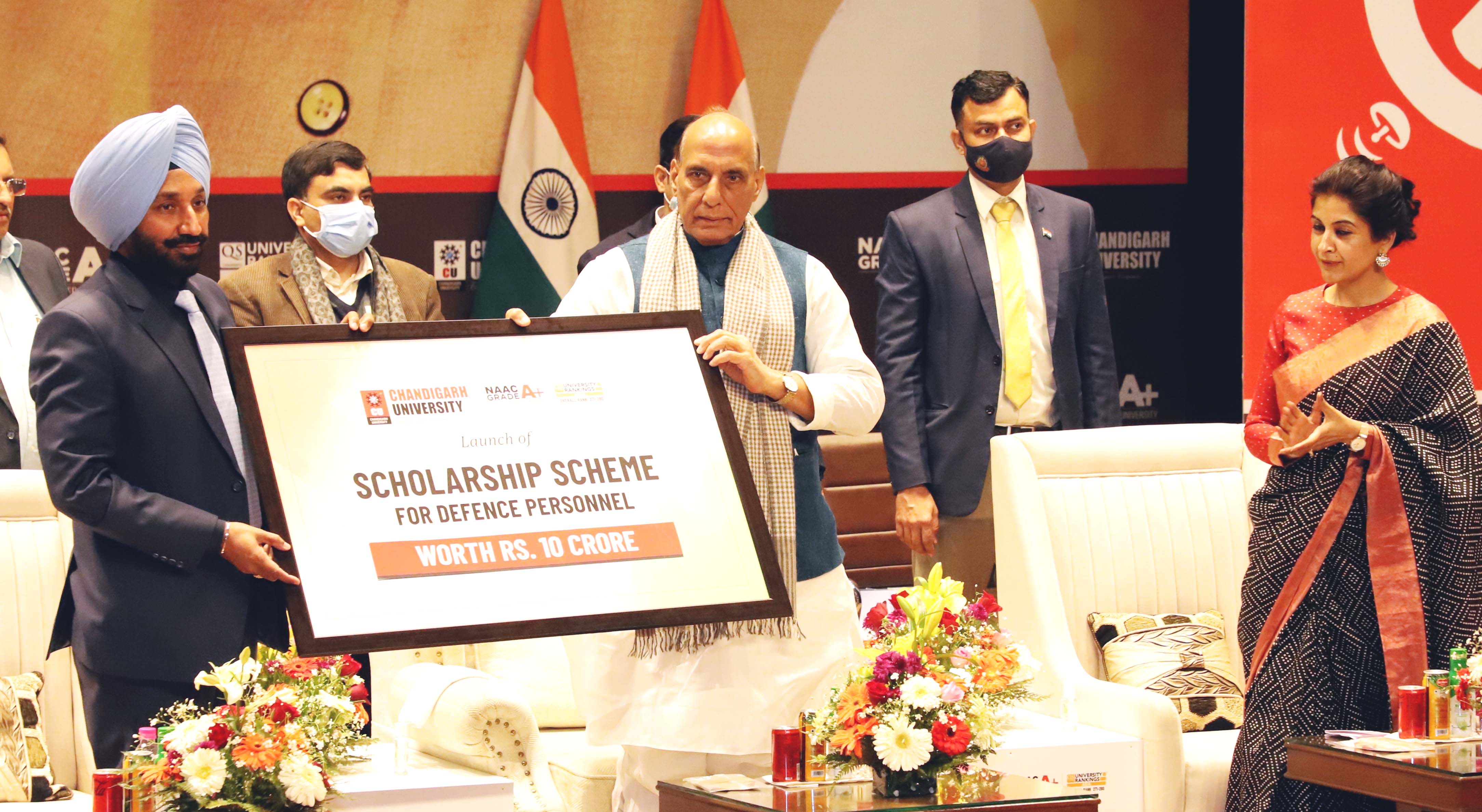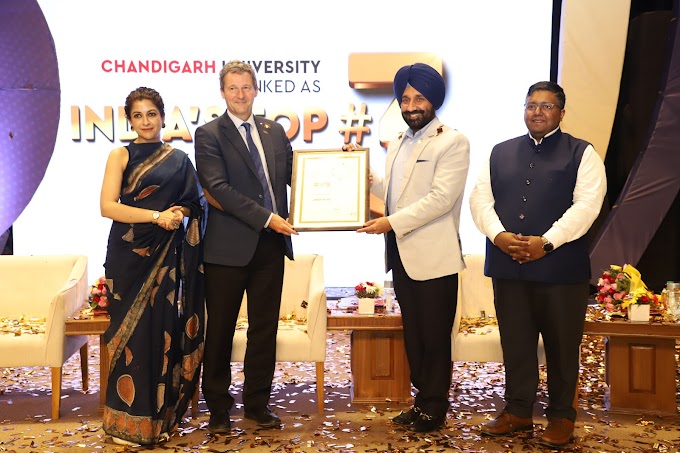Defence Minister Rajnath Singh inaugurates Kalpana Chawla Centre for Research in Space Science & Technology at Chandigarh University, Gharuan
Defence Minister launches Defence Scholarship Scheme worth Rs 10 Crore for wards of defence personnel
Rajnath Singh calls for long term public-private partnership to make India a knowledge economy
Chandigarh University's 'CUSAT' to be one of the 75 student-made satellites being launched as a part of Amrut Mahotsav
Reiterating the government’s commitment of strengthening the private sector for the holistic development of the nation, Defence Minister Shri Rajnath Singh Ji on Monday said that an active and long-term public-private partnership is crucial to take the education & science sectors to a global level and make India a knowledge economy. He was speaking at the inauguration ceremony of Kalpana Chawla Centre for Research in Space Science & Technology (KCCRSST) at Chandigarh University, Gharuan, the first of its kind in North India.
The Union Minister also launched Chandigarh University’s Defence Scholarship Scheme, worth Rs 10 Crore, for the wards of Defence Personnel of the three services.
Addressing the gathering, Shri Singh hailed the establishment of the KCCRSST, and said that it is only through efforts like these that India can become a leader in future technologies. Likening the Research Centre with ‘pride of India’ Kalpana Chawla, the Defence Minister hoped that this research facility would touch new heights of success, similar to the remarkable achievements of the late India-born astronaut who brought universal recognition to her country of origin.
Established with the objective of training students in space science and satellite development and to meet future challenges in the area of space research, this state of the art space centre would be the Ground Control Station (GCS) for the Chandigarh University's Student Satellite (CUSAT), an in-house developed nano-satellite being designed by the students of Chandigarh University, and a Geo Spatial Centre for research, besides other important projects.
Chancellor of Chandigarh University, S. Satnam Singh Sandhu, senior vice-president Prof Himani Sood, eminent scientists, faculty and students were present during the inauguration ceremony.
The Defence Minister lauded the Chandigarh University for setting records of success in research & innovation, placements and global rankings in the last few years and described the achievements of the University as a symbol of the increasing participation of the private sector in the field of education.
“All these achievements of Chandigarh University are examples of the increasing importance of private sector in the education sector of our country. I believe that if the education, knowledge-science of our country has to reach the world level, and the country has to be made a 'knowledge economy', then the public and private sector of the country will have to work together, and in this direction we Moving forward fast,” he said in his address, after the inauguration.
Remembering late India-born astronaut Kalpana Chawla, Shri Rajnath Singh described her as a symbol of women empowerment, and urged the people to motivate their daughters to go ahead & touch unimaginable heights, echoing the Government’s vision of increased participation of women in all sectors.
“It is extraordinary for a university to have its own space research centre and its own satellite. This is commendable feat and I am certain that more Indians like Aryabhatta, Vikram Sarabhai, Satish Dhawan and Kalpana Chawla will emerge from amongst you all if you eye different planets and constellations,” the Defence Minister told the students present on the occasion.
It may be mentioned here that CUSAT will be among the 75 student-built satellites to be launched into space on the eve of the 75th Independence Day in 2022. The Chandigarh University has joined the list of 13 institutes like Indian Institute of Technology (IIT) Kanpur, IIT Bombay and became the first university in North India to design and develop its own satellite. For the project, 75 students of the University have been working on the Chandigarh University Student Satellite Project under the guidance of eminent Indian scientists including Padma Shri Prof RM Vasagam, Padma Shri Dr Mylaswamy Annadurai, Padma Shri YS Rajan, Padma Bhushan Dr BN Suresh, Padma Shri Dr BN Dattaguru, V Mahadevan, Dr L V Muralikrishna Reddy, and Dr K Gopalakrishnan.
With the launch of CUSAT, Punjab will become the first border state in India to have its own satellite in space. The launch of the university's nanosatellite-CUSAT will prove to be an important step for the country, as it will collect data related to border intrusion detection, agriculture, weather forecasting, natural disaster forecasting, which will be helpful in research and study of various problems in these areas. In addition, the GCS will help develop satellite research facilities and launch satellites in countries that do not have developed satellite technology. The GCS under the KCCRSST will monitor majority of Low Earth Orbit (LEO) Satellites including CUSAT and being a member of SatNOGS project, will be monitoring more than 380 satellites with over 810 transmitters in more than 50 Countries.
 |
| CUSAT team which designing the first Student Satellite of North India along with Union Defence Minister Shri Rajnath Singh and Chandigarh University Chancellor, Satnam Singh Sandhu |
 |
| Union Defence Minister Shri Rajnath understanding the design of CUSAT Satellite being developed by the students of Chandigarh University |
“Through this centre, which has come up at the cost of Rs 3.50 Crore, Chandigarh University will help in developing satellite research facilities in 57 countries including Brazil, Egypt, Colombia, Turkey as well as train foreign students for satellite design and development,” S. Sandhu added.








